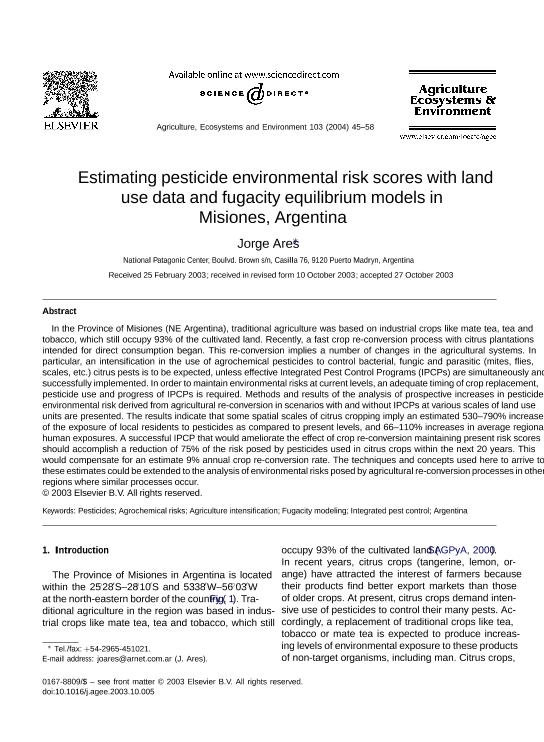Artículo
Estimating pesticide environmental risk scores with land use data and fugacity equilibrium models in Misiones, Argentina
Fecha de publicación:
01/2004
Editorial:
Elsevier Science
Revista:
Agriculture, Ecosystems and Environment
ISSN:
0167-8809
Idioma:
Inglés
Tipo de recurso:
Artículo publicado
Clasificación temática:
Resumen
In the Province of Misiones (NE Argentina), traditional agriculture was based on industrial crops like mate tea, tea and tobacco, which still occupy 93% of the cultivated land. Recently, a fast crop re-conversion process with citrus plantations intended for direct consumption began. This re-conversion implies a number of changes in the agricultural systems. In particular, an intensification in the use of agrochemical pesticides to control bacterial, fungic and parasitic (mites, flies, scales, etc.) citrus pests is to be expected, unless effective Integrated Pest Control Programs (IPCPs) are simultaneously and successfully implemented. In order to maintain environmental risks at current levels, an adequate timing of crop replacement, pesticide use and progress of IPCPs is required. Methods and results of the analysis of prospective increases in pesticide environmental risk derived from agricultural re-conversion in scenarios with and without IPCPs at various scales of land use units are presented. The results indicate that some spatial scales of citrus cropping imply an estimated 530–790% increase of the exposure of local residents to pesticides as compared to present levels, and 66–110% increases in average regional human exposures. A successful IPCP that would ameliorate the effect of crop re-conversion maintaining present risk scores should accomplish a reduction of 75% of the risk posed by pesticides used in citrus crops within the next 20 years. This would compensate for an estimate 9% annual crop re-conversion rate. The techniques and concepts used here to arrive to these estimates could be extended to the analysis of environmental risks posed by agricultural re-conversion processes in other regions where similar processes occur.
Archivos asociados
Licencia
Identificadores
Colecciones
Articulos(CCT-CENPAT)
Articulos de CTRO.CIENTIFICO TECNOL.CONICET - CENPAT
Articulos de CTRO.CIENTIFICO TECNOL.CONICET - CENPAT
Citación
Ares, Jorge Oscar; Estimating pesticide environmental risk scores with land use data and fugacity equilibrium models in Misiones, Argentina; Elsevier Science; Agriculture, Ecosystems and Environment; 103; 1; 1-2004; 45-58
Compartir
Altmétricas




